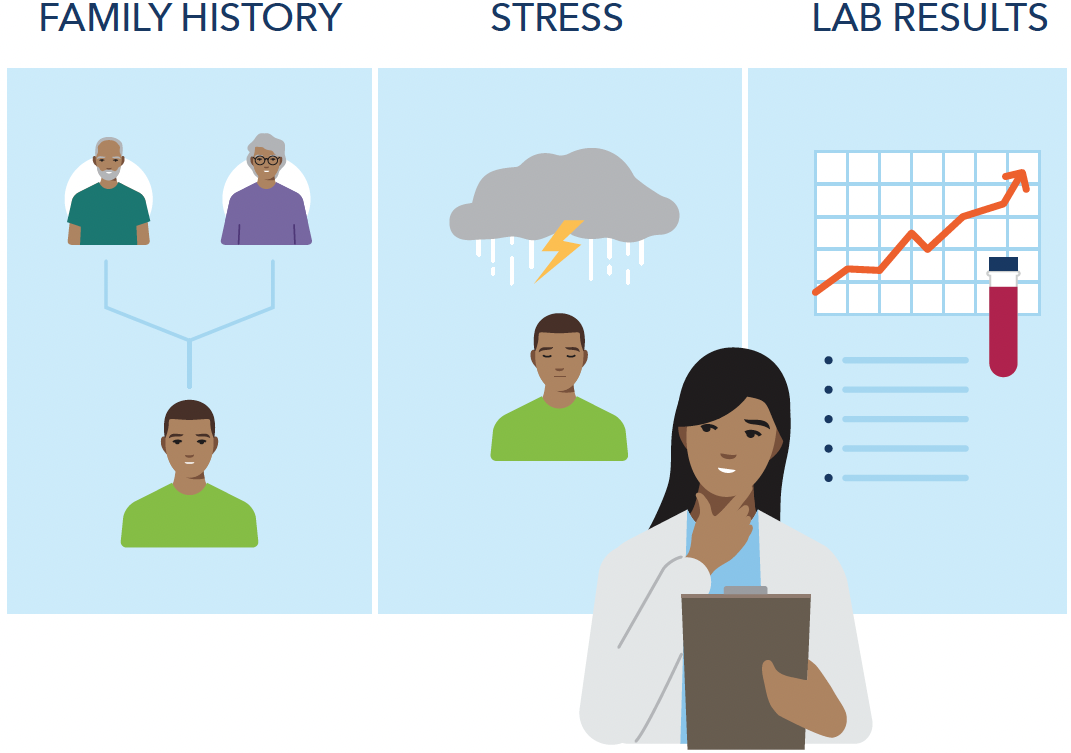
The mind and body are connected. Kaiser Permanente helps our members take care of both.
We provide high-quality mental health care through a blend of patient centered care, evidence-based practices, and innovative solutions such as feedback informed care, collaborative care, and digital therapeutics.
Patients can enter our system through a variety of avenues, including self-referral, referral from primary care into collaborative care, clinician referral to a specialty provider, or taking an assessment (such as a PHQ-9 or GAD-7) supported by clinician-guided navigation.
Feedback informed care
Kaiser Permanente uses a feedback informed care model to deliver mental health and addiction care services. This measurement-based approach places the patient voice at the center of decision making and treatment choices.
Providers use patient-reported information to track their progress and understand their response to different treatments, supported by a computer-based outcome management system.
When clinicians are properly trained in this method and patients regularly provide feedback, this approach can improve mental health outcomes.
One study of this approach examined changes in depression and showed that a standard depression measure, PHQ-9 scores, can be significantly decreased (from 13.42 to 8.75) in roughly 12 sessions, using FIC.
The same was true for patients who took the questionnaire measuring generalized anxiety disorder, known as the GAD-7.
These patients’ GAD-7 scores decreased from 11.08 to 7.70, when comparing baseline scores from the first to last session.

Collaborative care
Primary care is often the first-place patients go to seek support when facing a mental health concern. Studies indicate that 40- 60% of treatment for mental illness occurs in primary care. Almost 70% of antidepressant prescriptions are written in primary care.
Collaborative care is an effective team-based model to care that often originates out of a primary care visit. Using this model, a care manager coordinates a patient’s treatment with their primary care clinician and a consulting psychiatrist from specialty mental health.

The care manager is also responsible for monitoring the patient’s progress and recommending any necessary interventions. As treatment progresses, all members of the team share access to the care and treatment plans.
Collaborative care offers advantages to patients and health care organizations. It uses fewer specialized mental health resources and is as or more effective than traditional care models.
Over 90 randomized controlled trials demonstrate this effectiveness. Furthermore, in treating depression, studies show it was twice as effective as standard care.
Collaborative care is also critical to health equity as it can alleviate disparities between white populations and communities of color (Black, Latino, Asian, and American Indian or Alaska Native persons).
It does this by bringing together health care professionals from different disciplines to work as a team in managing a patient’s care. This helps ensure that care is comprehensive, coordinated, and culturally sensitive. This is important for communities of color and marginalized groups who historically face barriers to accessing health care.
Kaiser Permanente ensures the quality of its collaborative care model though monitoring and continuous process improvement. Our individual service areas determine what metrics are most useful and inform what is collected and tracked nationally.
Digital therapeutics and telehealth
When it comes to providing tele-behavioral health care, Kaiser Permanente supports prevention, early intervention, and treatment for emotional health and wellness with a variety of evidenced-based digital tools, including video and telephone appointments and digital therapeutics.
In this context, the term “tele-behavioral health” means the use of phone and video technology, along with supportive digital services, to provide care for people with a wide range of mental health conditions.
Everyone is on a different journey when it comes to mental health, so our suite of digital options reflects the varying needs, lifestyles, and learning styles of our members.
A clinician can also guide members to a suite of digital resources within our system. Some of these resources are open to all members. Others require a referral because they are highly specialized tools used for specific diagnoses.

Our digital tools are piloted in clinical settings and reviewed to ensure a quality user experience, a strong evidence-base, and alignment with our organization’s commitment to equity, inclusion, and diversity.
These resources include user-friendly, educational resources, such as articles, videos, and podcasts, along with a variety of mental health applications. Several digital therapeutic applications like Calm or Headspace Care are available at no cost to members at kp.org.
Addiction care and harm reduction
Overdose has emerged as a leading cause of death in the United States, highlighting the urgent need for effective interventions.
Kaiser Permanente is leading the way to reduce the risk of overdose in our members and reduce the stigma around obtaining treatment for substance use disorders.
A key component of our approach is the Zero Overdose Dashboard and Best Practice Alert system. These tools play a critical role in tracking patients who are at high risk and are prescribed medication, such as Naloxone, to counteract opiate overdose.
By monitoring the impact of these interventions, we can refine our strategies to prevent overdose incidents more effectively. This allows us to understand the effectiveness of specific interventions and to reduce the number of overdoses.
At the same time, we provide a clinician education program that prepares them to identify an issue and act quickly to prescribe at-risk patients with lifesaving medication.
Our partnership with Shatterproof, a nonprofit organization dedicated to the fight against addiction, further amplifies our efforts. Together, we have developed an online education program for our workforce, grounded in the latest science of addiction.
This partnership enriches our understanding of addiction and equips our team with the knowledge to offer compassionate, informed care to those in need.
These efforts collectively reflect Kaiser Permanente’s commitment to reducing the incidence of overdose and breaking down barriers to treatment for substance use. By leveraging technology, education, and partnerships, we are creating a safer, more supportive environment for our members.
